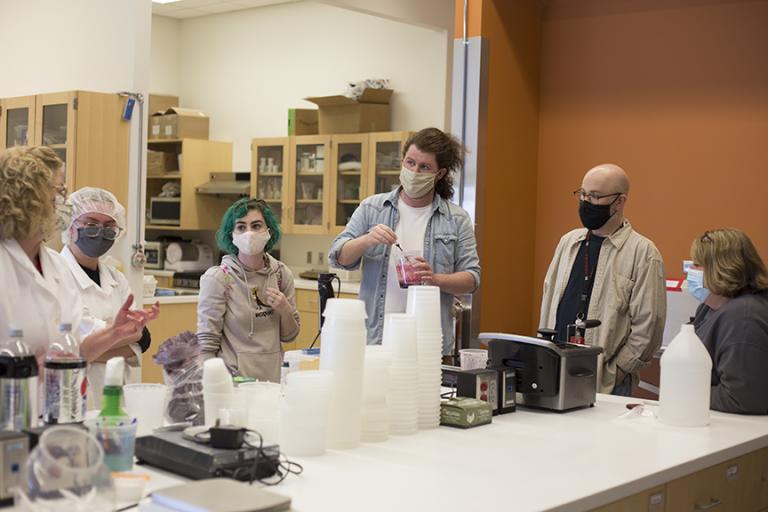
Nebraska Rep’s ‘Dracula: Mina’s Quest’ will be webcast May 6-9
calendar icon28 Apr 2021 user iconBy Kathe C. Andersen

Lincoln, Neb.--The Nebraska Repertory Theatre closes its season with Steven Dietz’s “Dracula: Mina’s Quest” May 6-9. The production will mark the Rep directorial debut of David Long, associate professor of theatre and head of the performance area in the Johnny Carson School of Theatre and Film.
“Dracula: Mina’s Quest” will have no in-person audience, due to the global pandemic. The performance will be webcast at 7:30 p.m. on May 6-8 and 2 p.m. on May 9. Tickets are free, but must be reserved at http://nebraskarep.org.
The Rep’s Apprentice Company takes the stage with a frightening and provocative new adaptation of Bram Stoker’s “Dracula.” Follow Mina, the brave heroine, as she dares to defy the ruler of the night. The play is not recommended for children or the faint of heart.
“Stephen Dietz, the playwright, had written a Dracula that was produced in the late 1990s,” Long said. “He came out with this version in 2019, and it’s only been produced a couple of places throughout the U.S. So the Rep will be producing the Midwest premiere of this play. What Dietz has done is he’s taken his original and reformatted it through what I would consider a modern lens. There’s more empowerment in the central character, Mina, and less reliance on the kind of male-dominated characters of the original Bram Stroker’s creation. She takes charge. She drives the narrative. And I think that’s what makes this more accessible and approachable for our audience.”
Nikki Wang, a senior theatre performance major from Chandler, Arizona, is playing the part of Mina.
“I think she’s amazing,” Long said. “She’s not only a thoughtful actor, but she’s a powerful actor on stage. She can control the space. She also has an impeccable British accent, and that’s required for this, as well. She brought all of those things together in her performance, and it’s been an absolute pleasure watching her develop her character.”
Wang said the role has been challenging.
“Mina begins the show as a perfectly suited young woman who obeys all the standards placed on women in her time. She is caring, intelligent, and ambitious, but most importantly to some of those around her, she is pure of heart and body,” Wang said. “To be perfectly honest, it has been a challenge for me at times to come to understand Mina, as someone whose views on gender politics and womanhood vary strongly from that of this time period.”
The production has been nearly a year in the making, as it was originally scheduled for fall. The global pandemic delayed the production until spring.
“It feels like it’s an epic project,” Long said. “Having rehearsed virtually in the fall over Zoom, we’re all really excited about finally getting to rehearse in person.”
To keep everyone safe, the play will be professionally recorded for webcast with no in-person audiences.
“I’m directing a play that’s intended for a live audience, but not for a live audience,” Long said. “I have misgivings, but I’m also inspired and excited that we’re having a professional video company come out and film this with multi cameras. It’s not going to be like an archival shoot. It’s going to feel more like ‘Great Performances’ on PBS, so I’m excited about that.”
Wang is excited to have the opportunity to be back on stage.
“It’s wonderful to be back on stage and seeing people again in a safer way. After a year of very carefully keeping a distance from even my friends and classmates, it's really incredible to be back on a stage and working again, though maybe a bit jarring at first,” she said. “I know my castmates and I are all very grateful for the chance to work in person again, an opportunity not many have been given at this time.”
Long has enjoyed working with the students on the production, both the actors and the designers.
“This experience has been super exciting because both the student actors and designers have stepped up to that professional level and have exceeded my expectations. They’ve produced not only beautiful costumes, lighting, sound and scenic elements, but everybody has collaborated so well and so kindly. The actors are inspired by not only the design, but by one another. This production has provided the necessary experience for many of them to be able to step up to the rigorous professional expectations of a full Rep and Equity production. And they have proven that they are ready.”
Emma Hoffbauer, a graduate student in the Carson School, is the scene designer for the production.
“The themes of the show are the same as the classic Dracula story we all know: the fight between light and dark, and the seduction of evil and madness by Dracula,” she said. “The show is very dark and beautiful, and I wanted the scenic design to hold those feelings, presented through the context of Victorian and Gothic aesthetic. The set largely consists of curled wrought iron and dark earthy stone which complement the organic netting reminiscent of blood that surrounds the space. The scenery moves in a sort of choreographed dance because Dracula’s unseen but lurking presence, and the tension it causes, is an important element of the show.”
Hoffbauer said everyone involved with the production is excited to bring theatre back to campus.
“It’s as if we have been holding our breath all year for the show to actually be real and complete,” she said. “It has been a fascinating challenge and learning opportunity to breathe life into this show because it lives in the world between live theatre and film. I can’t wait for patrons to see the finished product.”
The production will also have live music composed by Glenn Korff School of Music senior Sam Stanley.
“Sam is not only an outstanding composer, but he is an accomplished cellist,” Long said. “He was here last night at rehearsal and just him playing in the space added so much texture and so much emotion to the show.”
It also wouldn’t be “Dracula” without some blood. For this production, the Carson School had a unique partnership with the Food Innovation Center at Nebraska Innovation Campus to create the blood used in the production.
“There’s a ton of blood. You can’t have Dracula without blood,” Long said.
But they needed special blood for the production. Associate Professor of Theatre Jamie Bullins said he was used to some of the issues when blood is used in productions.
“There’s a multitude of ways that the blood has to be used as an effect in the show,” Bullins said. “If it’s an effect that was used, like it just gets on things, there are laundry issues you have to deal with. I’m used to that. That was the first concern because it’s a period piece. So it’s not like you can just throw some t-shirts and jeans int the laundry.”
But in some scenes, the blood gets in people’s mouths.
“It’s Dracula, and they’re biting people,” Bullins said. “And there’s a rat that somebody eats, and that is the one that really causes all the issues because Dracula literally breaks the neck of a rat and then squeezes it, and the blood flows down directly into someone’s mouth. That also means they had to be able to swallow it.”
That led to the blood needing some special dietary considerations for some of the actors, including being gluten-free.
“We want to make sure that student safety is the top priority,” Bullins said.
After doing a lot of research, Bullins didn’t find anything that would work. So he turned to the Food Innovation Center to see if they would help. He was connected to Julie Reiling, a senior consultant FPC at the Food Processing Center.
“I took Jamie’s initial call about creating an edible, gluten-free, sugar-free, non-staining blood for a vampire production that the theater department was going to do,” Reiling said. “We often get some interesting requests for assistance with some unique food items, but I can honestly say that this has been the most bizarre request we have ever received.”
Bethany Jackson, the manager of technical services at the Food Processing Center, said it was a unique request.
“A request for edible, gluten-free, sugar-free, non-staining blood was not a food product I would have ever thought to get a request to develop. After I finally grasped what the request was and from UNL’s theatre department, I was reminded how much I love my job and where I work. Never a dull moment,” Jackson said. “Jamie and his team were great to work with., and had us laughing through evaluating the color, viscosity and texture for the imitation blood to look real.”
Reiling wasn’t worried about the product being gluten-free or sugar-free, as those are typical requirements.
“I was way more worried about trying to find a red color that wouldn’t stain,” she said. “We’ve had several working meetings with Jamie and a couple of his folks to try to zero in on a fake blood that was the right color, didn’t stain, and had the right viscosity (thickness). Bethany Jackson (our food product developer) and some of our Food Processing Center student workers did a great job working on this project.”
Both teams from the Carson School and the Food Innovation Center have been working to get everything just right.
“It’s been fun,” Bullins said. “One of the great things about working on a college campus is that there are all these fantastic people who have specialties. Because of what we do, in theatre, it changes every day. How often is somebody going to ask me to make a gluten-free, edible blood that also doesn’t stain clothing? And so we have challenges a lot. It’s great to have these specialized people on campus who know so much more about this that I do and who are willing to go out of their way to help. The folks over at Food Innovation have been super nice to us, super collaborative.”
Long said they were appreciative to have this resource available on campus to turn to for a solution.
“It’s saved not only a lot of money, but it’s been an exciting project,” he said. “And I think that’s the support you get from a Big Ten School, a research institution, that you don’t get from other institutions.”
Wang said there is a lot in store for the audience with the production.
“Audiences can expect a quick-paced gothic tale told with the help of some truly beautiful hand-made costumes from our costume team, an incredible original score by our cellist Sam Stanley, and hopefully some really fun blood effects,” she said.
Long hopes audiences will watch the production.
“There are wildly entertaining moments, but there are also very poignant, thoughtful and authentic moments in this production that I think will really resonate with our viewers,” he said. “It’s really a gothic adventure story, but it’s a new take on it. It’s about an empowered female character, and I’m really excited about that. I’m also excited about the audience seeing the outstanding student design work that’s been going on. We’re going to take the audience on a journey that I don’t think they’ve seen at the Rep for a while. I’m so excited about being a part of it.”